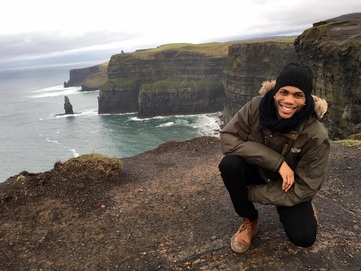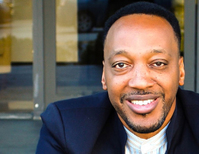 When Sean Watkins was 15, a member of the Rotary Club came to his school and told his class about a year-long Rotary Foreign Exchange Student program in Brazil. The local Rotarian chapter offered to assist any student interested in going. Having already known a few exchange students at his school, Sean felt pretty excited about the opportunity. The very next day he brought back his permission slip. "I was a new person. The experience made me evaluate my identity as an American. And how the rest of the world views America." That first year, Sean says he journaled a lot. While he enjoyed being there, he had gone alone that first year and noted that there was no one around that looked like him. "I would have liked for there to be people around like me that I could connect with." When asked how his experience was different as a person of color, he described times where it felt he had to be a "race ambassador." "The more I’ve traveled, I’ve learned that there are often many times where you will experience micro-aggressions while abroad. There was an incident once where these two European exchange students I was friends with in Brazil began to recite racist nursery rhymes. They never even know the words they used were racist, so to explain that to them while keeping my cool was a lesson I’ll never forget." When Sean returned to Brazil five years later, he was able to gain a deeper understanding of his first experience. "There were things that happened in 2006 that I didn't quite begin to understand until 5yrs later when I was able to go back in my 20’s. By this time, I learned and understood more about the racial and social history about the country." On that second visit to Brazil 5yrs later, Sean lived in Salvador, the Blackest city of Brazil, with over 80% of the population identifying as Black. Unlike the south of Brazil where he had lived, "I realized I had the privilege of 'blending in' —I looked like the people there and I spoke the language. Today, Sean has a career that allows him to travel the world; a career he says he might not otherwise have if he hadn't gone to Brazil that first time. He credits his grandmother, a dancer and singer who traveled all over the world for inspiring him. Sean credits his mother who gave him her unwavering support when he was 16, for something she knew he was passionate about; something he says he never takes for granted. "I'm grateful for those who came before me. Langston Hughes, James Baldwin, they too had the similar discoveries and wrote about them. I feel connected to them in this way and am very grateful." Sean Watkins is the Social Media Manager for OurVoices, the global campaign leg of GreenFaith. Since joining the OurVoices team a year ago, he has been integral to increasing the digital reach and engagement of the interfaith community on social media around climate action. Most recently, he has become the co-host for "Climate Voices," a podcast born out of the Paris climate talks. Before joining OurVoices, he managed editorial content and social media for an online platform designed to empower LGBTQ Christians. A graduate of Michigan State University, Sean is fluent in Portuguese and is based in Brooklyn, NY.
 Trabian Shorters, founder of BMe Community (Image: BMe Community) Trabian Shorters, founder of BMe Community (Image: BMe Community) Which of the following statements is false?
If you know who Trabian Shorters is, you probably already knew which statements were true and which was false. Shorters, co-author (with former NAACP president Ben Jealous, now a partner at Kapor Capital) of The New York Times best-seller, Reach: 40 Black Men Speak on Living, Leading, and Succeeding, founded and leads the national community organization that is changing the American narrative about black men. (Read Full Article here) |
Archives
July 2020
Categories
All
|
 RSS Feed
RSS Feed